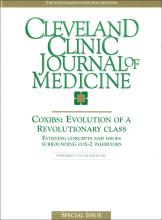ABSTRACT
Arthritis causes considerable patient morbidity and substantial health care resource utilization. One important contributing component to the overall cost burden of this condition is the variety of expenditures attributable to the adverse effects of arthritis therapy. Nonselective nonsteroidal anti-inflammatory drugs (NSAIDs) are a mainstay of medical treatment for patients with arthritis because of their well-established anti-inflammatory and analgesic effects. Generally well tolerated, traditional NSAIDs nevertheless cause adverse gastrointestinal (GI) effects in a proportion of patients. Because nonselective NSAIDs are so widely used, these GI adverse events cause significant morbidity and mortality, accounting for substantial additional health care expenditures. Data from controlled investigations document the enhanced GI safety of cyclooxygenase (COX)-2–selective inhibitors, or coxibs, when compared with nonselective NSAIDs. As a result of this improved safety profile, patients treated with coxibs use significantly fewer GI-related health care resources (eg, medications, procedures) than patients treated with nonselective NSAIDs. Thus, available clinical and economic data suggest that the use of coxibs has the potential to result in important clinical GI benefits at an acceptable incremental cost for all chronic NSAID users. For individuals who are at an increased risk of developing GI complications attributable to NSAIDs, coxibs are clearly a cost-effective treatment option.
- Copyright © 2002 The Cleveland Clinic Foundation. All Rights Reserved.






